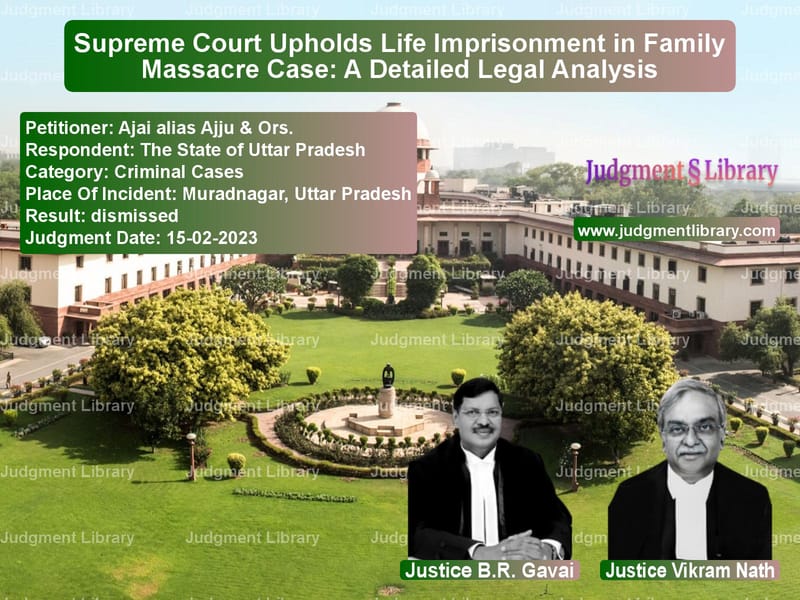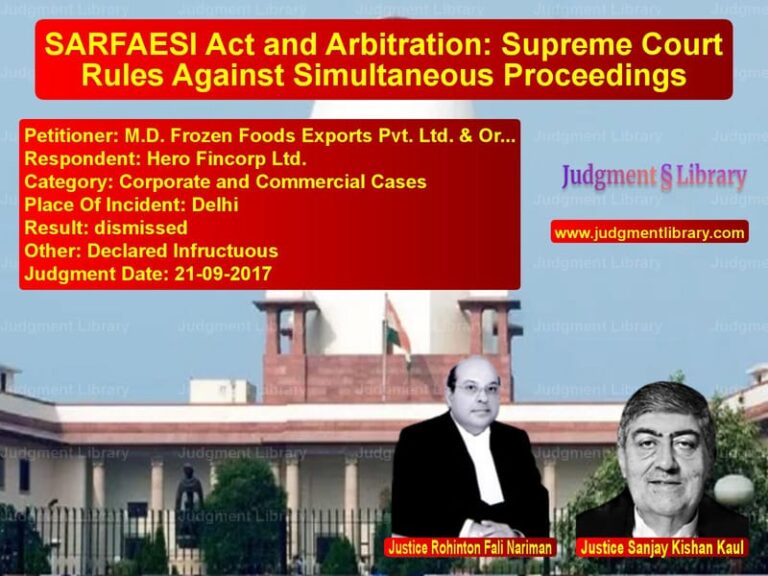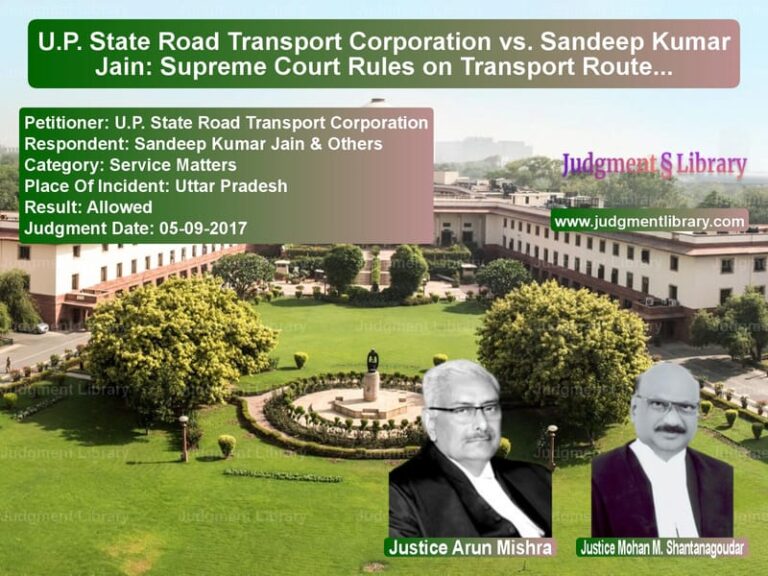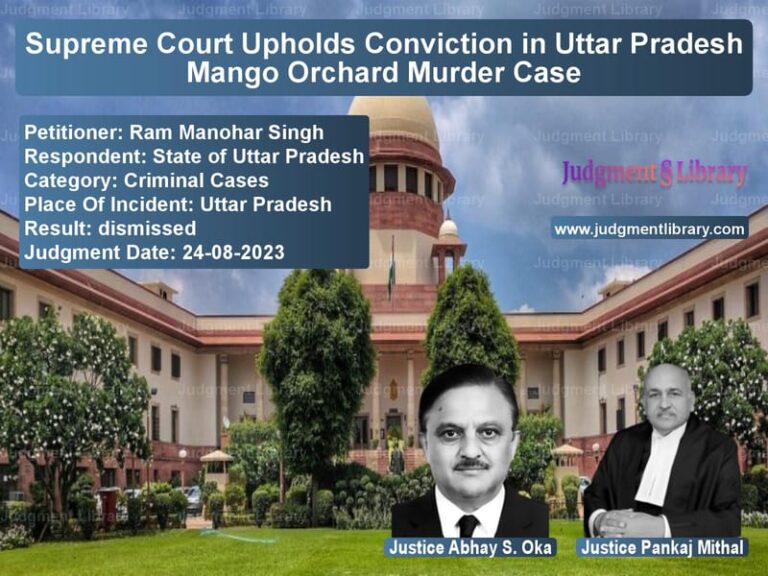Supreme Court Upholds Life Imprisonment in Family Massacre Case: A Detailed Legal Analysis
The Supreme Court of India, in the case of Ajai alias Ajju & Ors. vs. The State of Uttar Pradesh, upheld the conviction of multiple accused in a gruesome family murder case that took place in Muradnagar, Uttar Pradesh. This judgment clarifies the significance of eyewitness testimony, forensic evidence, and circumstantial evidence in criminal trials.
Background of the Case
The case revolved around the brutal murder of four members of a family on August 25, 2007, in Muradnagar, Ghaziabad, Uttar Pradesh. The victims included:
- Vijay Pal Singh (Head of the Family)
- Rajesh (Wife of Vijay Pal Singh)
- Nishant (Son of Vijay Pal Singh)
- Mangal Singh (Son-in-law of Vijay Pal Singh)
The only survivor, Pinky, daughter of Vijay Pal Singh, sustained severe injuries but managed to stay alive.
Prosecution’s Case
The prosecution argued that the accused – Braj Pal, Mukesh, Ravi, and Ajai alias Ajju – had conspired to kill the family over a longstanding dispute. According to the prosecution:
- The accused entered the house at around 3:00 AM and used sharp-edged weapons such as talwars (swords) and gandasa (axes) to attack the victims while they were asleep.
- Pinky (PW-1), who was also attacked, survived by pretending to be dead.
- The accused fled the scene, believing they had killed everyone.
- Later, police recovered blood-stained weapons and stolen mobile phones from the accused.
- Forensic evidence confirmed that the weapons matched the injuries on the victims.
Key Evidence Presented
The prosecution relied heavily on eyewitness testimony, forensic evidence, and circumstantial evidence to build its case:
- Pinky’s Testimony: As an injured survivor, she provided a firsthand account of the attack, identifying the accused.
- Medical Reports: Forensic analysis confirmed that the weapons recovered from the accused matched the wounds inflicted on the victims.
- Post-Mortem Reports: The reports detailed deep wounds on the necks and bodies of the victims, confirming the use of sharp-edged weapons.
- Recovery of Weapons: The accused led the police to the location where the blood-stained weapons were hidden.
Defense’s Arguments
The defense argued that the accused were falsely implicated due to family enmity. They presented the following points:
- Pinky’s testimony was unreliable as she initially did not name the accused.
- There was no independent witness to corroborate her claims.
- There was no direct evidence linking the accused to the crime scene.
Supreme Court’s Observations
The Supreme Court extensively analyzed the evidence and ruled:
“The testimony of an injured witness holds the highest evidentiary value. PW-1, having sustained grievous injuries, had no reason to falsely implicate the accused while sparing the real culprits.”
Key observations made by the Court:
- The last-seen theory applied since the accused were last seen near the victims’ house before the attack.
- The forensic and medical evidence corroborated Pinky’s testimony, confirming the use of recovered weapons.
- The sequence of events narrated by Pinky matched the crime scene investigation.
Final Judgment
The Supreme Court upheld the convictions under Section 302 IPC (murder) but declined to award the death penalty. The final judgment included:
- Jail Term: Life imprisonment for all accused.
- Dismissal of Appeals: The Court rejected appeals for acquittal and enhancement of punishment.
Legal Implications of the Judgment
This ruling reinforces several important legal principles:
- Eyewitness Testimony: Testimonies of injured survivors hold the highest weight in criminal cases.
- Forensic Evidence: Blood stains, post-mortem reports, and weapon analysis played a crucial role in securing conviction.
- Circumstantial Evidence: The Court reaffirmed that a conviction could be based on strong circumstantial evidence when direct proof is unavailable.
Conclusion
The Supreme Court’s ruling in Ajai alias Ajju & Ors. vs. The State of Uttar Pradesh underscores the importance of reliable witness testimony and forensic evidence in criminal trials. By upholding life imprisonment, the Court ensured justice was served while maintaining fairness in sentencing.
Petitioner Name: Ajai alias Ajju & Ors..Respondent Name: The State of Uttar Pradesh.Judgment By: Justice B.R. Gavai, Justice Vikram Nath.Place Of Incident: Muradnagar, Uttar Pradesh.Judgment Date: 15-02-2023.
Don’t miss out on the full details! Download the complete judgment in PDF format below and gain valuable insights instantly!
Download Judgment: ajai-alias-ajju-&-or-vs-the-state-of-uttar-p-supreme-court-of-india-judgment-dated-15-02-2023.pdf
Directly Download Judgment: Directly download this Judgment
See all petitions in Murder Cases
See all petitions in Bail and Anticipatory Bail
See all petitions in Custodial Deaths and Police Misconduct
See all petitions in Judgment by B R Gavai
See all petitions in Judgment by Vikram Nath
See all petitions in dismissed
See all petitions in supreme court of India judgments February 2023
See all petitions in 2023 judgments
See all posts in Criminal Cases Category
See all allowed petitions in Criminal Cases Category
See all Dismissed petitions in Criminal Cases Category
See all partially allowed petitions in Criminal Cases Category







